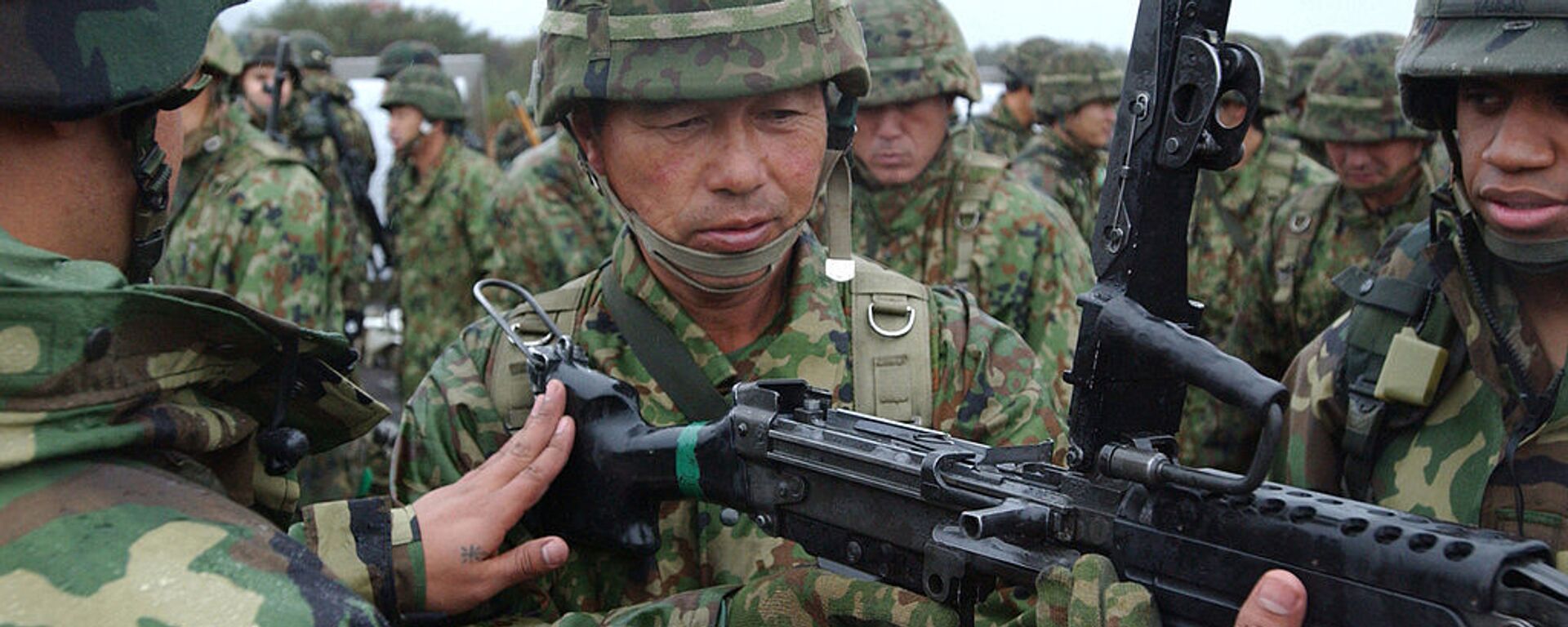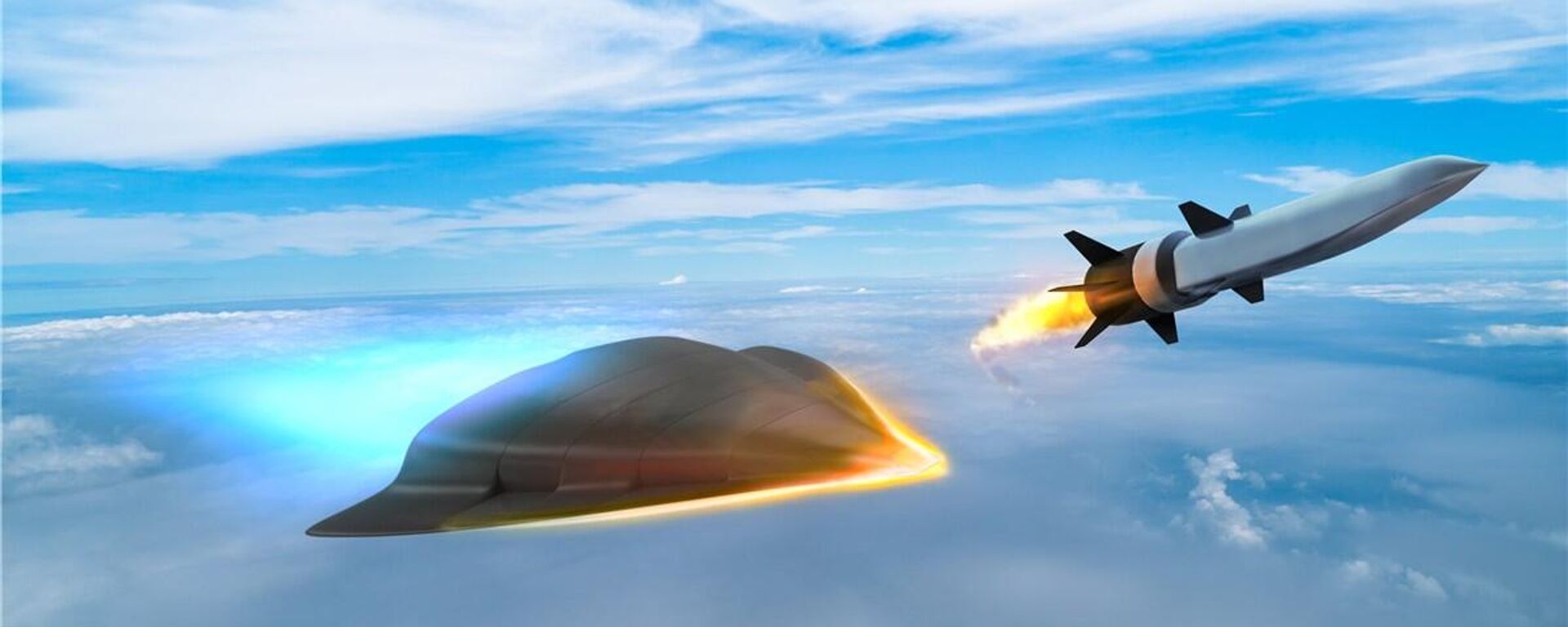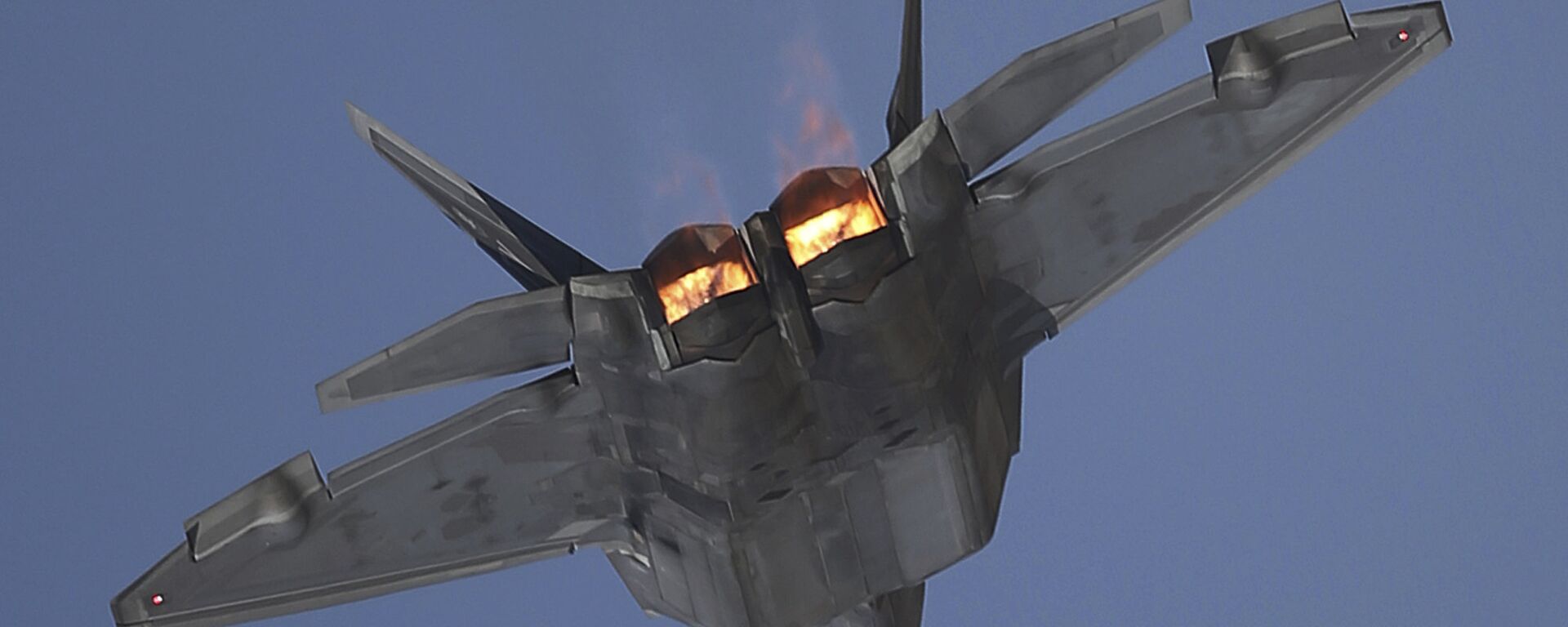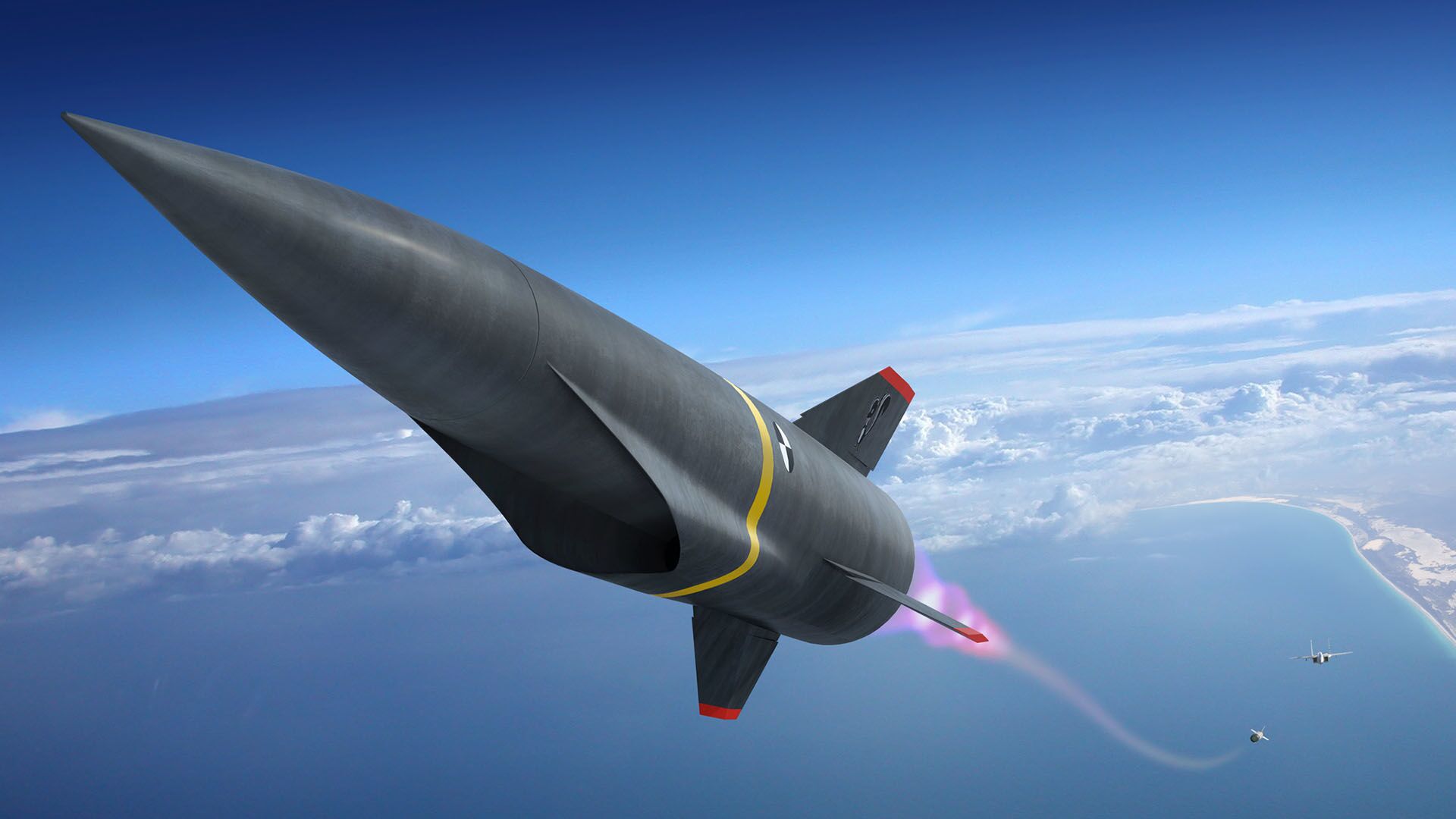https://sputnikglobe.com/20230214/japans-hypersonic-weapons-wont-make-asia-pacific-more-secure-but-the-contrary-expert-warns-1107429068.html
Japan's Hypersonic Weapons Won't Make Asia-Pacific More Secure, But the Contrary, Expert Warns
Japan's Hypersonic Weapons Won't Make Asia-Pacific More Secure, But the Contrary, Expert Warns
Sputnik International
The Japanese Defense Ministry is reportedly seeking to obtain a long-range hypersonic weapon (LRHW) and Tomahawk cruise missiles from the US. Russian military... 14.02.2023, Sputnik International
2023-02-14T16:50+0000
2023-02-14T16:50+0000
2023-09-18T13:37+0000
analysis
us
japan
asia-pacific region
south korea
hypersonic missiles
military & intelligence
china
russia
militarization
https://cdn1.img.sputnikglobe.com/img/107828/13/1078281309_0:0:1920:1080_1920x0_80_0_0_e856ff810f92f9df25f9d9fff409b2d8.jpg
"Japan is working on hypersonic technologies together with the Americans, justifying this by self-defense needs even though the United States qualifies these weapons as offensive," Russian military expert Alexei Leonkov told Sputnik. "At the moment, we are talking about the deployment of new LRHW (long-range hypersonic weapon) hypersonic missiles on Japanese territory. This American weapon has a range of up to 3,000 km (1,725 miles). Thus, the entire Russian Far East, Kamchatka, all of North Korea and most of China would be within its striking range. Japan must understand that these steps will not go unnoticed by the Democratic People's Republic of Korea (DPRK), China and Russia."The Japanese media has recently reported that Tokyo is considering a US plan to deploy intermediate-range missiles on its territory across the first island chain. While the location of the deployment has not yet been specified, the media referred to Kyushu, the southernmost of the four largest Japanese islands.From Pacifism to MilitarismIn the aftermath of the Second World War, Tokyo adhered to a largely pacifist security policy. However, over the last decade, Japan has been gradually revising its defense strategy. Last year, the nation unveiled a bold new military plan that envisages considerably stepping up its defense expenditures within the next five years. The new funding, amounting to roughly $320 billion, marks the country's largest military build-up since the Second World War.The country's colonial past still haunts Japan, according to the military expert: during the Second World War, Japan sought to establish colonies in China and Korea."The Japanese wanted to build a second new Japan in Manchuria, engaging in genocide of the local population," Leonkov continued. "Koreans were also subjected to purges [by the Japanese]. The historical crimes of militaristic Japan still 'live' in the memory of the inhabitants of neighboring countries. Therefore, if Japan tries to show its strength again (or participate in American military scenarios), it runs a risk of losing all of its territory. This will happen in the event of retaliatory strikes by China and the DPRK, which Japan will not withstand, despite all the defensive weapons."Earlier, the Russian Foreign Ministry stated that it would respond to Japan if any threats are posed to the Far East, which includes the deployment of hypersonic missiles on the Japanese islands.Hypersonic ProjectAccording to Leonkov, Tokyo is misleading its population about threats from Russia, China, and North Korea. The Japanese leadership probably believes that the militarization of the region will increase their survival odds, the military expert suggested, adding that weapons are not always the best solution to the problem.Meanwhile, the US hypersonic weapons are still under development. The Pentagon's fiscal year 2023 budget request for hypersonic research is $4.7 billion – up from $3.8 billion in the FY2022 request. The Missile Defense Agency additionally requested $225.5 million for hypersonic defense. The Pentagon and Congress have recently shown a growing interest in boosting the development and near-term deployment of hypersonic systems. According to a recent US congressional report, "this is due, in part, to the advances in these technologies in Russia and China."For its part, Japan has long been interested in hypersonic projects, too, but these programs were largely peaceful. In particular, the Japanese wanted to create an aircraft flying in the upper atmosphere at hypersonic speeds. However, today this project is morphing into a military one, according to Leonkov.However, if Japan joins the transatlantic bloc, it will no longer be a neutral country, which would affect the balance of forces in the region, according to the military analyst.Muscle-Flexing in Asia Pacific is IncreasingJapan is not the only country that has recently been closing ranks with the US and muscle-flexing in the region: South Korea has also adopted a more militarist and hardball approach to its neighbors, China and the DPRK.On Monday, Washington hosted consultations between the United States, South Korea, and Japan on security cooperation in the Asia-Pacific region and around the world. They were attended by US Deputy Secretary of State Wendy Sherman, South Korean First Vice Minister of Foreign Affairs Cho Hyundong, and Japanese Vice Minister Mori Takeo.According to Wendy Sherman, the participants of the summit discussed "challenges" posed by Beijing and Pyongyang."We will remain aligned with the Republic of Korea (ROK), Japan, other allies and partners worldwide to push back on the People's Republic of China behavior that challenges the rules-based regional and international order," the joint statement said. "Throughout our meetings, our three governments reinforced the necessity of addressing the DPRK’s destabilizing behavior and achieving complete denuclearization of the Korean Peninsula."While the US is insisting on the DPRK's denuclearization, Leonkov does not rule out that the US could push Japan to obtain nuclear weapons one day to beef up the alliance's positions in the region.Meanwhile, it was the US that supplied both uranium and technologies for nuclear power plants to Japan, according to the expert. If Japan obtains nuclear weapons, the region will verge on an apocalyptic scenario, Leonkov concluded.
https://sputnikglobe.com/20230112/us-japan-military-buildup-in-asia-pacific-shatters-regional-stability-scholars-warn-1106260516.html
https://sputnikglobe.com/20221028/ex-dod-officer-us-hypersonic-race-with-russia--china-wont-save-the-day-peace-talks-are-a-must-1102802409.html
https://sputnikglobe.com/20230203/south-korea-us-stage-another-joint-air-drills-to-improve-military-cohesion-1106950137.html
japan
south korea
china
russia
north korea
Sputnik International
feedback@sputniknews.com
+74956456601
MIA „Rossiya Segodnya“
2023
News
en_EN
Sputnik International
feedback@sputniknews.com
+74956456601
MIA „Rossiya Segodnya“
Sputnik International
feedback@sputniknews.com
+74956456601
MIA „Rossiya Segodnya“
us-japan military cooperation, japan's deployment of long-range hypersonic weapon (lrhw), japan wants to acquire tomahawk cruise missiles, militarization of asia pacific, japan revised defense strategy, japan's military buildup
us-japan military cooperation, japan's deployment of long-range hypersonic weapon (lrhw), japan wants to acquire tomahawk cruise missiles, militarization of asia pacific, japan revised defense strategy, japan's military buildup
Japan's Hypersonic Weapons Won't Make Asia-Pacific More Secure, But the Contrary, Expert Warns
16:50 GMT 14.02.2023 (Updated: 13:37 GMT 18.09.2023) The Japanese Defense Ministry is reportedly seeking to obtain a long-range hypersonic weapon (LRHW) and Tomahawk cruise missiles from the US. Russian military expert Alexei Leonkov has explained to Sputnik why this could end badly for Tokyo.
"Japan is working on hypersonic technologies together with the Americans, justifying this by self-defense needs even though the United States qualifies these weapons as offensive," Russian military expert Alexei Leonkov told Sputnik. "At the moment, we are talking about the deployment of new LRHW (long-range hypersonic weapon) hypersonic missiles on Japanese territory. This American weapon has a range of up to 3,000 km (1,725 miles). Thus, the entire Russian Far East, Kamchatka, all of North Korea and most of China would be within its striking range. Japan must understand that these steps will not go unnoticed by the Democratic People's Republic of Korea (DPRK), China and Russia."
The Japanese media has recently reported that Tokyo is considering a US plan to deploy intermediate-range missiles on its territory across the first island chain. While the location of the deployment has not yet been specified, the media referred to Kyushu, the southernmost of the four largest Japanese islands.

12 January 2023, 17:54 GMT
From Pacifism to Militarism
In the aftermath of the Second World War, Tokyo adhered to a largely pacifist security policy. However, over the last decade, Japan has been gradually revising its defense strategy. Last year,
the nation unveiled a bold new military plan that envisages considerably stepping up its defense expenditures within the next five years. The new funding,
amounting to roughly $320 billion, marks the country's largest military build-up since the Second World War.
"Tokyo believes that deploying hypersonic missiles will help it defend itself, but this is a very naive approach. Moreover, it borders on insanity, as it can lead to the most terrible scenario: the apocalypse in Japan, given its militaristic past," Leonkov said.
The country's colonial past still haunts Japan, according to the military expert: during the Second World War, Japan sought to establish colonies in China and Korea.
"The Japanese wanted to build a second new Japan in Manchuria, engaging in genocide of the local population," Leonkov continued. "Koreans were also subjected to purges [by the Japanese]. The historical crimes of militaristic Japan still 'live' in the memory of the inhabitants of neighboring countries. Therefore, if Japan tries to show its strength again (or participate in American military scenarios), it runs a risk of losing all of its territory. This will happen in the event of retaliatory strikes by China and the DPRK, which Japan will not withstand, despite all the defensive weapons."
Earlier, the Russian Foreign Ministry stated that it would respond to Japan if any threats are posed to the Far East,
which includes the deployment of hypersonic missiles on the Japanese islands.

28 October 2022, 15:17 GMT
According to Leonkov, Tokyo is misleading its population about threats from Russia, China, and North Korea. The Japanese leadership probably believes that the militarization of the region will increase their survival odds, the military expert suggested, adding that weapons are not always the best solution to the problem.
Meanwhile, the US hypersonic weapons are still under development. The Pentagon's fiscal year 2023 budget request for hypersonic research is $4.7 billion – up from $3.8 billion in the FY2022 request. The Missile Defense Agency additionally requested $225.5 million for hypersonic defense. The Pentagon and Congress have recently shown a growing interest in boosting the development and near-term deployment of hypersonic systems.
According to a recent US congressional report, "this is due, in part, to the advances in these technologies in Russia and China."
For its part, Japan has long been interested in hypersonic projects, too, but these programs were largely peaceful. In particular, the Japanese wanted to create an aircraft flying in the upper atmosphere at hypersonic speeds. However, today this project is morphing into a military one, according to Leonkov.
"The Japanese are now providing all of their research to the Pentagon and the United States," said the Russian military expert. "The Americans have pooled the resources of all NATO countries involved in the development of hypersonic technology. And Japan was engaged in the first place, since it has advanced the farthest in this sphere. It is being increasingly drawn into the NATO bloc. The current NATO strategy is aimed at ensuring that this military bloc is no longer European. It will become transnational, capable of [including] any country of the world. And Japan [may become] one of the first to join the NATO bloc."
However, if Japan joins the transatlantic bloc, it will no longer be a neutral country, which would affect the balance of forces in the region, according to the military analyst.

3 February 2023, 12:40 GMT
Muscle-Flexing in Asia Pacific is Increasing
Japan is not the only country that has recently been closing ranks with the US and muscle-flexing in the region: South Korea has also adopted a more militarist and hardball approach to its neighbors, China and the DPRK.
On Monday, Washington hosted consultations between the United States, South Korea, and Japan on security cooperation in the Asia-Pacific region and around the world. They were attended by US Deputy Secretary of State Wendy Sherman, South Korean First Vice Minister of Foreign Affairs Cho Hyundong, and Japanese Vice Minister Mori Takeo.
According to Wendy Sherman, the participants of the summit discussed "challenges" posed by Beijing and Pyongyang.
"We will remain aligned with the Republic of Korea (ROK), Japan, other allies and partners worldwide to push back on the People's Republic of China behavior that challenges the rules-based regional and international order," the joint statement said. "Throughout our meetings, our three governments reinforced the necessity of addressing the DPRK’s destabilizing behavior and achieving complete denuclearization of the Korean Peninsula."
While the US is insisting on the DPRK's denuclearization, Leonkov does not rule out that the US could push Japan to obtain nuclear weapons one day to beef up the alliance's positions in the region.
"Nuclear technologies used at nuclear power plants make it possible to transfer them to the military category," Leonkov explained. "There is waste [in Japan] from which weapons-grade plutonium can be obtained. And then it's up to the technologies of thermonuclear fusion: that is, a thermonuclear charge. If North Korea (whose technological capabilities are very modest) could do it, then Japan is all the more capable. Tokyo knows this, but does not publicly declare it yet, since the United States has not yet given its approval for this."
Meanwhile, it was the US that supplied both uranium and technologies for nuclear power plants to Japan, according to the expert. If Japan obtains nuclear weapons, the region will verge on an apocalyptic scenario, Leonkov concluded.





